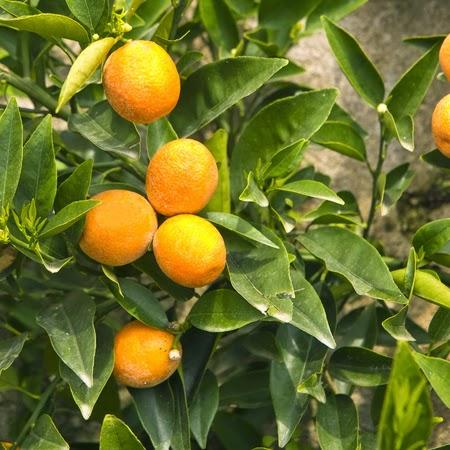-Essential-Oil.png)
-Essential-Oil.png)



Botanical name Citrus bergamia
Botanical synonym: Citrus aurantium subsp. bergamia Risso & Poit.
Family Rutaceae
Origin Italy
Source Fruit peel
Description / Color / Consistency: A thin, light yellowish green to yellowish brown liquid.
Aromatic Summary / Note / Strength of Aroma The aroma is basically citrus, yet fruity and sweet with a warm spicy floral quality, and is reminiscent of Neroli, giving a middle note of medium strength.
Blends With Black Pepper, Clary Sage, Cypress, Frankincense, Geranium, Jasmine, Mandarin, Nutmeg, Orange, Rosemary, SandalWood, Vetiver and Ylang-Ylang
Product Abstract
The Bergamot tree can grow up to four meters high, with star-shaped flowers, and smooth leaves, bearing citrus fruit resembling a cross between an orange and a grapefruit but in a pear-shape. The fruit ripens from green to yellow. The name Bergamot is derived from the city Bergamo in Lombardy where the oil was first sold.
Cautions: Organic Bergamot Essential Oil has phototoxic properties and exposure to the sun must be avoided after application to the skin. Due to the presence of bergaptene in this oil, please consult a physician prior to using it. Dilute well before use; May cause skin irritation in some individuals; a skin test is recommended prior to use. Contact with eyes should be avoided.
Harvesting
Citrus bergamot is commercially grown in southern Calabria, southern Italy. It is also grown in southern France and in Côte d'Ivoire for the essential oil and in Antalya in southern Turkey for its marmalade.The fruit is not generally grown for juice consumption.However, in Mauritius where it is grown on small-scale basis, it is largely used for juice consumption by the locals.
Common Usage
Caution
Bergamot oil must be protected from sunlight, because of bergaptene, one of its components becomes poisonous if exposed to sunlight. That is why the oil should always be stored in dark bottles and dark places. Exposure to sunlight should even be avoided after it is applied or rubbed onto the skin, at least until it gets absorbed into your skin.
Key constituents
(þ)-Limonene 27.4–52.0%
Linalyl acetate 17.1–40.4%
Linalool 1.7–20.6%
Sabinene 0.8–12.8%
g-Terpinene 5.0–11.4%
b-Pinene 4.4–11.0%
a-Pinene 0.7–2.2%
b-Myrcene 0.6–1.8%
Neryl acetate 0.1–1.2%
Non-volatile compounds
Bergamottin 0.68–2.75%
5-Geranyloxy-7-methoxycoumarin 0.08–0.68%
Citropten 0.01–0.35%
Bergapten 0.11–0.33%
Bergaptol 0–0.19%
5-Methoxy-7-geranoxycoumarin 0.04–0.15%
Psoralen 0–0.0026%
Quality Bergamot oil may be adulterated with synthetic linalool, limonene and linalyl acetate, and with other citrus oils or their residues, usually orange or lime. Bergamot oils sold through the ‘Consorzio di Bergamotto’ are guaranteed to be unadulterated. Other adulterants include rectified or acetylated ho oil.
Safety summary
Hazards Phototoxic (moderate risk);may be photocarcinogenic.
Contraindications (dermal) If applied to the skin at over maximum use level, skin must not be exposed to sunlight or sunbed
rays for 12 hours.
Cautions Old or oxidized oils should be avoided.
Maximum dermal use level 0.4% to avoid phototoxicity.
Our safety advice
Because of its limonene content, oxidation of bergamot oil should be avoided by storage in a dark, airtight container in a refrigerator. The addition of an antioxidant to preparations containing it is recommended.
Regulatory guidelines Has GRAS status. IFRA recommends that, for application to areas of skin exposed to sunshine, bergamot oil be limited to a maximum of 0.4% in the final product, except for bath preparations, soaps and other wash-off products. In Europe, essential oils containing furanocoumarins must be used so that the total level of bergapten will not exceed.
Organ-specific effects
Adverse skin reactions No irritation was observed when 2% bergamot oil was patch tested in 1,200 dermatitis patients. In a 48 hour occlusive patch test on 50 Italian volunteers, the highest concentration of bergamot oil producing no adverse reaction was 30%. When similarly tested at 10%, it produced three reactions in 590 eczema patients. Tested at 30% on 25 volunteers, bergamot oil was not sensitizing. Of 1,200 dermatitis patients patch tested, two were sensitive to 2% bergamot oil. In a study of 200 consecutive dermatitis patients, three were sensitive to 2% bergamot oil on patch testing. Autoxidation products of (þ)-limonene can cause skin sensitization.
Systemic effects
Acute toxicity No information found for unrectified bergamot oil, though rectified bergamot oil is distinctly non-toxic.
Carcinogenic/anticarcinogenic potential Bergamot oil was not mutagenic in either a Bacillus subtilis rec-assay or an Ames test. Bergamot terpenes induced glutathione S-transferase activity to more than 2.5 times control level in mouse tissues. Bergamot oil is cytotoxic to neuroblastoma cells. Bergamot oil inhibited formation of the carcinogen NDMA in vitro by more than 70%. (þ)-Limonene displays anticarcinogenic activity.
Comments There is a need to raise public awareness to the phototoxic dangers of bergamot oil by adequate labeling and additional information. Assuming a maximum bergapten content of 0.33%, and to comply with the 15 ppm (0.0015%) SCCNFP guideline for bergapten, expressed bergamot oil should not be used at more than 0.45%, which correlates with the IFRA recommended maximum use level of 0.4%. A treated oil, sometimes rectified by distillation, is obtainable as bergapten-free.